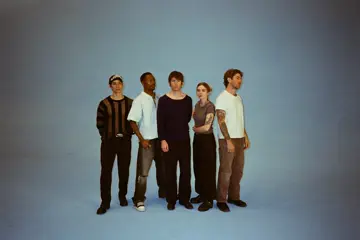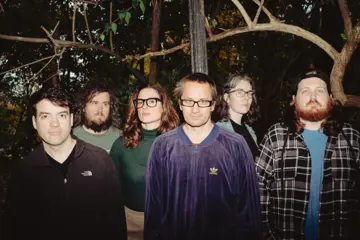BRIDGE OF SPIES

Bridge Of Spies begins with a bang. Well, figuratively speaking. Steven Spielberg may’ve once, long ago, invented the Summer Blockbuster, but, one fiery U-2 plane-crash aside, his Cold War thriller is absent of explosions. Instead, the bang it begins with is silence; calm, measured, taut, gripping silence. Patiently, Spielberg charts the daily routine of Brooklynite Mark Rylance, a seemingly anonymous everyman — another hatted chap in a late-’50s sea of chaps-in-hats — who spends his days making oil paintings, receiving hidden messages, and eluding the men tailing him (in a brilliantly-edited scene of subway subterfuge and crowded confusion) each time he leaves the house. This spellbinding, pure-cinema opening effectively announces that Bridge Of Spies will be Spielberg’s most interesting, meaningful film since 2007’s Munich. And, by the time the FBI kicks down Rylance’s door to arrest him for being a Russian spy, still no one’s said a word.
That changes when Tom Hanks, grumpy and garrulous, enters the fray. He’s an insurance lawyer given a hero’s introduction; arriving mid-monologue, using language, deftly, to minimise his client’s culpability in a pile-up.The densely-worded scenes of introduction show the hand of the Coen Brothers, who gave the screenplay of Matt Charman (Suite Française) enough of a once-over to be notable presences. Soon, Papa Hanks — much to the chagrin of wife Amy Ryan and daughter Eve Hewson (Nurse Elkins!) — has been appointed Rylance’s defence counsel; the government wanting the appearance of a democratically-sound trial, not a show-trial.
In its opening half, Bridge Of Spies is a Cold War movie that, in many ways, has nothing to do with the Cold War. Instead, it’s a pretty clear parable for the contemporary treatment of spies, perceived enemies of the state, and, most notably, those who leak secrets of national importance. The screenplay has those now-we-know-better notes of revisionism — Hanks regards Cold War hysteria with wry scepticism — but it uses them as smart juxtaposition. If we now smirk at ‘duck-and-cover’ as a nuclear-blast survival technique, what does it say about us that, over half-a-century ago, dissident prisoners were treated with more dignity than contemporary whistleblowers? When Hanks heads into court, and passionately sounds a plea for humanity in the face of nationalist fury, is he not decrying our own culpability in the Guantánamo gulag and the dogleashes of Abu Ghraib? Soon enough, he’s mentioning democracy, the constitution, and the righteous fairness of Americans, and, lo, the swelling string music lets you know that Spielberg can’t just put his prestige-pic pandering wholly on hold.
As Hanks is going about his Oscar-bait business, a few glimpses of a B-story — Austin Stowell and Jesse Plemons as pilots recruited to fly spy-planes covertly over Soviet Russia — suggest that this courtroom drama is heading someone else. And, not long after he’s saved Rylance from execution, Hanks is sent off to snowy East Berlin, to a country whose existence America refuses to officially acknowledged. Hence, Hanks, as a private citizen, is the perfect person to engineer an exchange of prisoners with the USSR — if things go pear-shaped, he — the lawyer who defended the Russian spy — will be the fall-guy.
Don't miss a beat with our FREE daily newsletter
Here,with the Berlin wall itself being built brick-by-brick as her crosses the border, back-and-forth, Hanks descends into a terrifying milieu of shadowy figures, covert meetings, and deliberate obfuscation. He’s equal parts Llewyn Davis and The Third Man: unable to shake a cold, robbed of his coat, and an amateur in a world of professionals. But, if Hanks is man in over his head, he’s also a man up for the task. As the CIA, the East Germans, and the Soviets attempt to use him as a pawn in a greater socio-politico game, Hanks games them right back.
Eventually, we get to the titular Bridge Of Spies, and a stand-off that stands as symbol for the Cold War itself: each party’s reluctance to show their hand the equivalent of two countries who spent a half century with their fingers lingering over the button. In its final stretch, Bridge Of Spies turns full circle, the heroic Oscar-speech of orations long silenced; the early steeliness, tautness, and patience of the picture back with aplomb.
THE LOBSTER

The Lobster marks the fourth film for YorgosLanthimos, but his greatness was long ago cemented. That came when he delivered the wonder of 2009’s Dogtooth, which is one of the 21st-century’s greatest motion-pictures, and the film that effectively kickstarted the Greek weird-wave.The Lobster marks his English-language debut, shot on location in Ireland with a cast headlined by Colin Farrell, Rachel Weisz, John C. Reilly, Ben Whishaw, Olivia Colman, and LéaSeydoux. But, though it marks a crossover, it’s a continuation of Lanthimos’s signature style: another deadpan parable that explores human behaviour in a wry, absurdist fashion.
The ‘hook’ for The Lobster is genius: in an alternate cine-world, any single citizens of the city are rounded up and sent to a seaside hotel. There, they’re given 45 days to find a mate or else be turned into an animal, and sent into the wild. It’s an incisive satire of the social weight of relationships, the lingering stigma of being single, unloved, unworthy. At first, this satire seems deliberately daft: the hotel’s educational plays ‘Man Eats Alone’ vs ‘Man Eats With Woman’ ridiculous in the pro-coupling encouragement; the best line of the film coming when Colman says, in instruction to a newly-anointed hotel couple: “if you have problems you can’t resolve, you’ll be assigned children.”
But slowly a sense of menace takes hold; this institutional treatment of the curse of singledom betraying the human capacity for systematised suffering. The hotel stops seeming like some ridiculous self-help seminar, more a prison of horrors; its hallways, stairwells, and endless expanses of patterned carpet taking on a Kubrickian creepiness.
And in its second half, we step outside of the hotel, and go amongst the Loners, who dwell in the forest between the hotel and the city, and whose own rules — about eating, dancing, sleeping, and dying alone — are just as strict. It’s here, with due irony, that Farrell and Weisz meet, and fall in love; a life-saver in the ‘normal’ world, but a kind of tragic death-sentence amongst the defiantly single. The Lobster slowly inches towards a finale that, like all of Lanthimos’s films, leaves audience interpretations open-ended. Here, he effectively leaves viewers to decide whether they’re an romantic optimist or a pessimist; whether they believe more in the human capacity for togetherness, or for selfishness.














